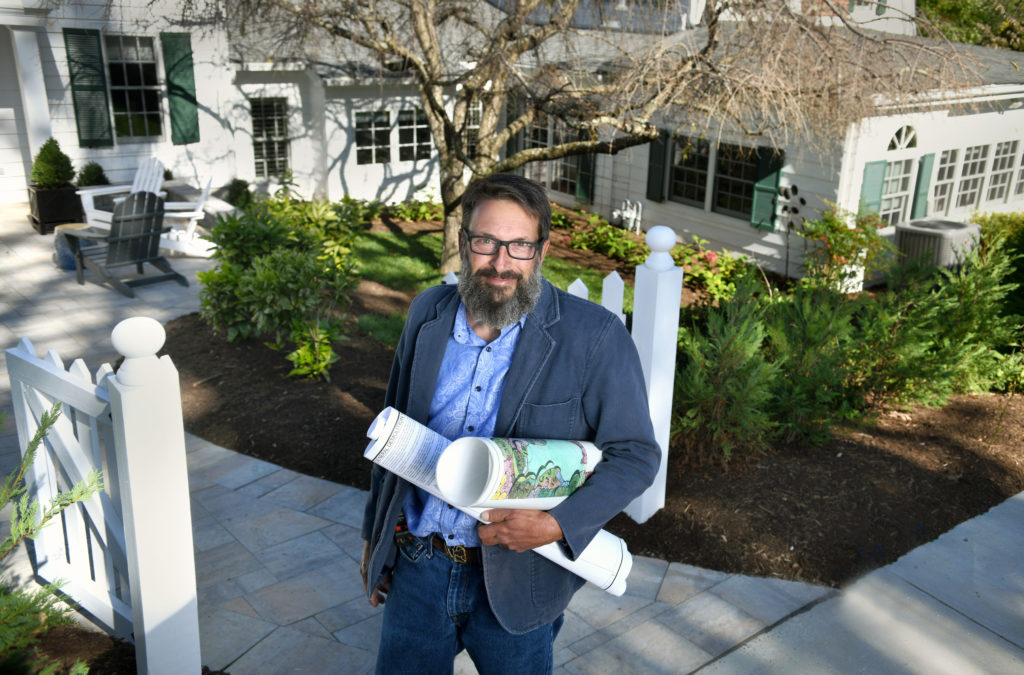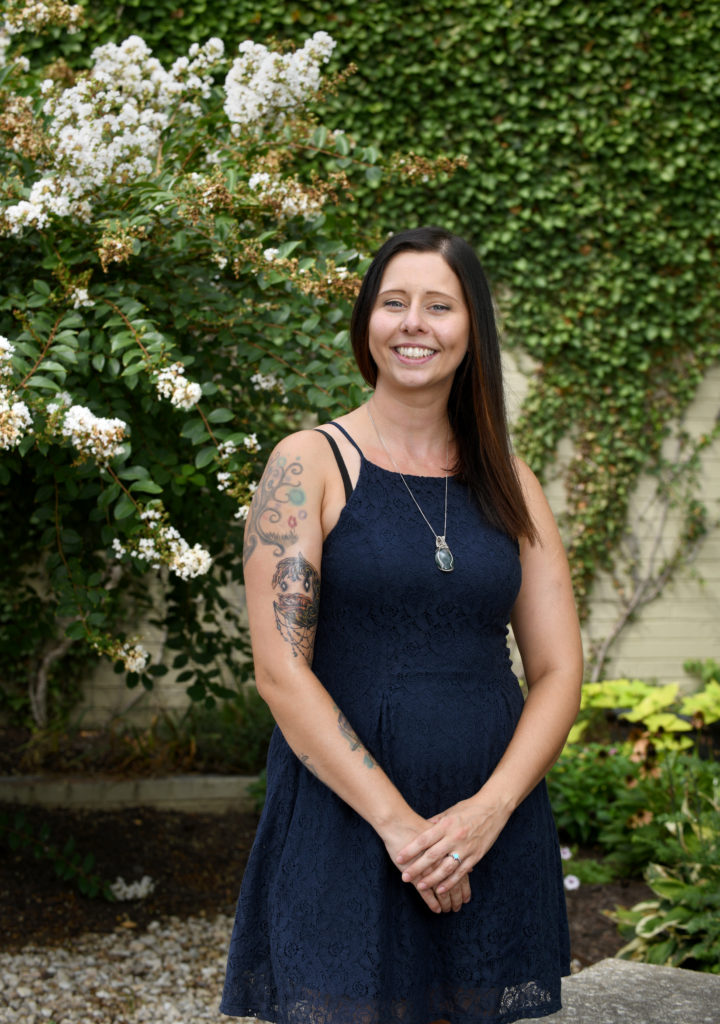(This story appeared in the Winter 2022 edition of IMPACT magazine, published annually by the Virginia Western Community College Educational Foundation.)
By Karenna Glover
Sean Beckner’s voice cracks when he talks about the time he interviewed for a job at a corporate lawn care company and got turned down because of his criminal record.
“I went outside to my car and I just started crying,” he recalls. “I said, ‘Man, what am I going to do? How am I going to provide for my son?’ “
It took some time and some hard work, but Beckner figured it out. After earning a career studies certificate in horticulture technology at Virginia Western, he now owns a successful business, SML Landscape Designs.
While he’s happy to be able to make a solid living — especially now that he has a fourth child on the way — Beckner says his main goal is being in a position to give people who need a second chance, like he once did, a job that pays a fair wage. “That’s what keeps me going, knowing there’s a bigger purpose,” he says.
Closing the horticulture workforce gap
In 2018, 150 partners, consisting of companies, gardening organizations and schools, formed a coalition to sound the alarm that too few young people were going into the horticulture field to be able to take the place of retiring workers.
The organization they created, cleverly named Seed Your Future, reports 58,000 jobs are expected to be available in the industry annually over the next few years, but only 61 percent are expected to be filled.
Waning interest in making plants a career parallels the declining enrollments for horticulture programs at colleges, universities and at training programs. The number of institutions offering horticulture-related degrees fell by 53 percent between 1997 and 2017, according to a 2019 study conducted by the American Society for Horticulture Science. The same study found that only 98 colleges offered certificate programs in horticulture — a 13 percent decrease since 2012.
Virginia Western can be counted among the shrinking number of institutions offering coursework for would-be horticulturists. Here, students can earn career studies certificates in greenhouse management, horticulture technology or landscaping.
With too few people going into the field, opportunity abounds in the green-collar workforce — as graduates of Virginia Western’s program attest. The Seed Your Future website lists hundreds of career pathways in the field.
“There’s a lot of variety,” agrees Beverley Angle, an alumni of Virginia Western’s horticulture program who now works for the Roanoke City Parks and Recreation Department’s urban forestry division. “It’s just a matter of knowing what’s going to make you happy.”
Hands-on horticulture
With some time, Beckner found a job working for a landscaping and hardscaping company at Smith Mountain Lake. He found he enjoyed being outside and working with plants.
Nature, Beckner will tell you, is God’s way of communicating.
Although he had an inkling that someday he might want to open his own business, Beckner could tell he had a lot to learn first.
When clients would mention azaleas and rhododendrons, Beckner would smile and nod to hide the fact he couldn’t tell one from the other. “If I want to actually have a business,” Beckner told himself, “I need to get educated.”
After signing up for horticulture classes at Virginia Western, Beckner quickly found himself learning to identify hundreds of plants and insects and spending hours propagating plants in the greenhouse.
Eventually, Beckner felt like he’d built up enough knowledge to go out on his own. While still taking classes, he launched SML Landscape Designs.
“It gave me the confidence to be able to go out into the field and say, ‘I am worth X amount of dollars,'” Beckner explains.
For Cynthia Holt, taking horticulture classes at Virginia Western was a way to gain a deeper knowledge about concepts she had learned over years working at a mom and pop nursery.

“Going back to school was absolutely fantastic for me, because then I got the scientific knowledge from people who have been in the business,” she says.
While Holt had learned a lot about caring for plants at the nursery, she struggled with pest and disease identification.
“It’s a little different when you get the whole science behind breaking life cycles and trying to control disease,” she says of her classes at Virginia Western. “It was just really fantastic.”
Bill Garren’s career launched in the 1990s when he began taking horticulture classes at Virginia Western. In his very first class he met someone who was looking to lease a mower. Garren signed on.
“I quickly found myself mowing lawns and kind of starting off in the landscaping business,” Garren explains. “I was taking the knowledge from class in the mornings and putting it to use in the afternoon.”
Garren liked that he didn’t spend his class time at a desk listening to a professor drone on and on about theories. He got to work in the dirt side by side with his instructors.
“That hands-on atmosphere was extremely beneficial,” he says. “I could take it right out and use it.”
Today, Garren is a certified arborist, a Class A Contractor and a landscape architect. He owns two businesses: Green Acres, which delivers landscaping services to residential and commercial clients, and Landscape Architects of Virginia, which provides designs for gardens and other green spaces.
Over the years, Garren has hired a number of graduates from four-year universities.
Too often, he says, they can identify any tree under the sun, but are woefully lacking in practical knowledge. “They didn’t know how to treat the tree or prune the tree, things like that,” he says.
It’s who you know
Angela Acres credits the connections she made as a horticulture student at Virginia Western with her professional success.
Today, Acres owns a small landscaping business with her partner called Luna Acres Horticulture. “We can mow your grass but also keep things weeded and also be able to look and say, ‘Oh, you have spider mites on this plant’ or ‘You have aphids over here and we need to do this treatment,’ ” she explains.
Acres nabbed one of her first clients in the summer of 2018 when organizers at RAMP, Roanoke’s regional business accelerator, asked Clark BeCraft, coordinator of Virginia Western’s horticulture program and Community Arboretum, to recommend someone who could plant and tend a small urban garden at their downtown office. He named Acres.
“Clark has absolutely been pivotal,” Acres raves.
Even though she completed her course work for the horticulture technology certificate back in 2019, the majority of Acres’ current clients even today come from recommendations from someone at Virginia Western or from someone who spotted her gardening at RAMP.
She’s so busy, Acres isn’t taking on new clients. “We’re really fortunate,” she says.

To finance her education, Acres relied on financial aid and scholarships she won through the Virginia Western Educational Foundation. (She received the Smith Mountain Lake Garden Club and Hunting Hills Garden Club scholarships.) “I was able to essentially get through it and even get paid a little bit of money to take classes,” she says.
To Acres, it’s important that other people know it’s possible to have a successful career without taking out supersized student loans.
“Here I am with a successful business and a certificate from Virginia Western debt-free, which is a huge feeling,” she says.
For Angela, a decade has passed since she graduated with an associate degree from Virginia Western. Even so, she considers BeCraft and Lee Hipp, former director of the College’s horticulture department, to be mentors. “I learned so much from them,” Angle says. “And I know they’re invested in helping people on their journeys.”
Holt certainly believes she’s benefited from her Virginia Western horticulture connections. Several years back, Hipp told Holt that a local agriculture cooperative store needed a garden center manager. He encouraged her to apply.
She did and got the job. “It was my experience that everyone at Virginia Western wanted you to succeed,” Holt says.





